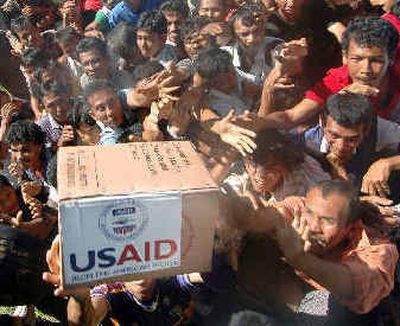Thousands more bodies found

BANDA ACEH, Indonesia – Indonesian searchers found thousands more bodies Friday on the devastated western coast of Sumatra as U.N. Secretary General Kofi Annan toured the area and said he was satisfied with the pace of the international effort to aid victims of the Dec. 26 earthquake and tsunami.
“I must admit, I have never seen such utter destruction, mile after mile,” Annan said after flying over the 120-mile stretch of coast closest to the epicenter of the earthquake that unleashed the tsunami across the Indian Ocean.
Town after town south of Banda Aceh, the capital of Aceh province, was wiped out.
“You wonder, where are the people? What happened to them?” Annan said.
Searchers in Meulaboh, the largest of the coastal cities leveled by the tsunami, pulled 7,118 more bodies from the rubble, helping to push the official death count from the disaster to more than 100,000 in Indonesia. The count for the region stands at 147,000.
Annan also visited Meulaboh, and said survivors were beginning to pick up the pieces of their community.
“That tells us something about the resilience of the human spirit,” Annan said. “And I believe that in time, given support and effort by the government and the international community, the people will be able to pick up the pieces and carry on.”
Secretary of State Colin Powell continued his tour of the region Friday, flying to Sri Lanka, the second hardest-hit nation, with an estimated 30,000 people killed. He visited a relief camp and met with Sri Lankan officials in the capital, Colombo.
“The United States is in solidarity with Sri Lanka,” Powell said. “We’re going to provide support working with the international community.”
In Thailand, British Foreign Secretary Jack Straw visited the resort island of Phuket. Many Europeans are still waiting to learn the fate of loved ones who were vacationing there when the tsunami hit.
The hundreds of bodies being found are so decomposed that they can’t be identified by sight. Forensics experts from 30 countries are examining fingerprints, dental records and DNA tests to try to match them with people reported missing from their countries.
“The scale of the effort still required is clearly daunting,” Straw said, noting that 500 unidentified bodies had arrived at one center in the last two days alone. “There are many hundreds of dead in the watery areas. It’s impossible to tell the country of origin of most of these poor souls.”
Forty-nine British citizens have been confirmed dead, mainly in Thailand, but also in the Maldives and Sri Lanka, and of those reported missing, British police have categorized 391 as “very likely to have been involved as victims,” Straw said.
“It is clear that for many families, a period of prolonged agony lies ahead,” he said. “Some victims may never ever be identified, and my heart goes out to all those” who face this ordeal.
U.N. experts flew by helicopter to the largely inaccessible Indonesian coast and spent about an hour in what remains of Meulaboh, said Mans Nyberg, a spokesman for the Office of the U.N. High Commissioner for Refugees, one of the participating agencies.
With large chunks of the coastal road wiped out and many parts of the coast still flooded, getting in to deliver aid, assess survivors’ conditions and needs, and find out how many people perished has been difficult.
At the Banda Aceh airport Friday afternoon, Annan defended the pace of the U.N. relief effort: “I think it is unfair to say we’re tardy. I think we moved as quickly as we can.”